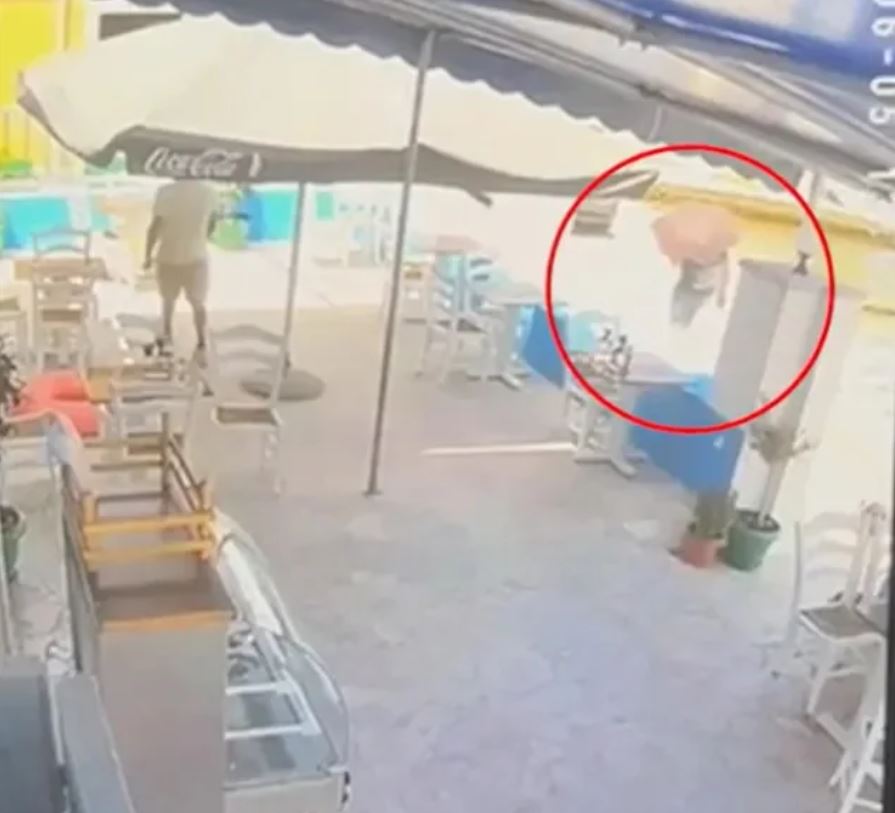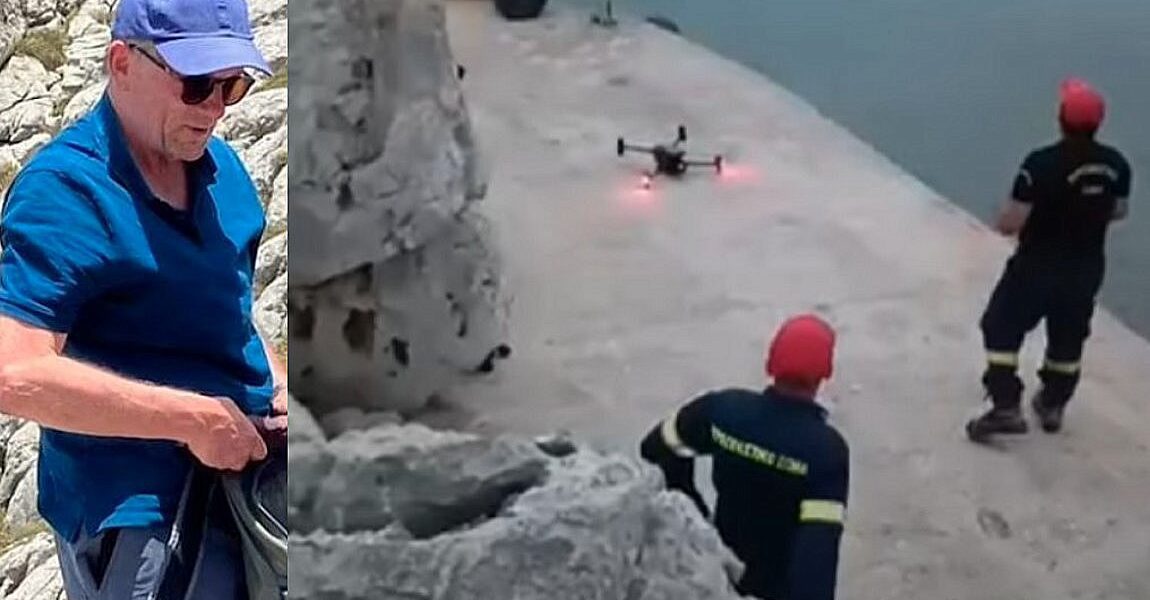Anxiety is at its peak regarding the fate of the Year-old BBC presenter, Michael Mosley, who disappeared in Symi.
"We are not losing hope," said the wife of the missing doctor and BBC presenter.
His wife, Dr. Claire Mosley, stated that the days since his disappearance have been "the longest and most unbearable."
In her statement, Claire Mosley said, “It has been three days since Michael left the beach for a walk. The longest and most unbearable days for me and my children."
“The search continues and our family is incredibly grateful to the people of Symi, the Greek authorities, and the British Consulate who are working tirelessly to help find Michael. We will not lose hope."
Dr. Mosley is searching the island with the help of friends. The couple's four children have also arrived in Symi to help with the search.
The BBC has reported new CCTV footage of a man believed to be Michael Mosley. This footage appears to show the last known sighting of the 67-year-old walking with an umbrella by the Pedi village marina last Wednesday, heading towards rocky hills.
Dr. Mosley, known for his TV programs and the BBC Radio 4 podcast "Just One Thing," disappeared four days ago while on holiday. He reportedly left the beach on foot.
The search and rescue operation, involving helicopters and drones, continues. It is believed to be one of the last two sightings of the man with the umbrella on security cameras before he left the village.
At 6:00 a.m. local time, firefighters began searching a 6.5-kilometer radius in a mountainous area surrounded by sea, said Manolis Tsiboukas, who organizes searches for missing persons in the Dodecanese. Asked if there had been any sign of Dr. Mosley, he said there had been "nothing."

A source directly involved in the investigations told BBC News that the search is focused on the mountainous area between Pedi Island and Symi. The source described it as "not easy ground."
One theory that emerged was that Dr. Mosley was trying to follow a much longer route than previously thought, traversing kilometers of exposed mountainside. Dr. Mosley's lodge was in the central city.
CCTV footage appears to capture the presenter on Pedi's main street holding an umbrella around 20 minutes after leaving the beach.
The BBC has seen a second piece of CCTV footage from a nearby building showing a man wearing the same clothes and holding the same umbrella, dated 1:50 p.m.
Officials are now ruling out the possibility that the father of four was hurt while walking between the beach and the field.
Separate CCTV footage from a house on the edge of Pedi Marina at the end of the village shows Michael Mosley later entering a mountain path at around 2:00 p.m. local time.
Mayor of Symi: "I Believe That Today We Will Find the Man"
The mayor of Symi, Lefteris Papakalodoukas, speaking to ERTnews, expressed his belief that once the investigation area has been targeted, things will be easier for the officers conducting the search.
"I believe that today the whole problem will end and we will find the man. We are desperately searching. It is a huge anxiety that we are all experiencing," he said, adding that there are over 150 foreign journalists on the island covering the issue.
Last night, new operations were carried out at the scene, where there were indications of Michael Mosley's presence, but to no avail. The specially trained police dog located on the island also participated in the investigations. Specially trained dogs from the Red Cross are expected to arrive from the island of Kos today.
Today, more firefighters are expected from Rhodes to assist in the investigation, while drones will also be deployed.
The deputy mayor of the island, Nikitas Gryllis, and the head of the "Silver Alert" service in the Dodecanese, Manolis Tsiboukas, spoke to ANT1 and the show "Studio with a View."
Mr. Gryllis emphasized that on Friday, authorities gained access to audiovisual camera footage showing the journalist heading towards a path near the Pedi area, which leads to a mountain. Thus, the investigations have focused exclusively on the mountain. "I believe that today we will have a result," assessed Mr. Gryllis, adding, "It is a mountain with a particularly complex morphology and difficult points. It includes a path that leads to the Ancient Marina and another that leads to its top."
Mr. Tsiboukas noted, "Until yesterday, unfortunately, we were searching blindly. Since yesterday, we have been oriented towards a direction we did not initially consider because we lacked guiding evidence. From yesterday, the investigations took a very intensive character. Twenty-three individuals were operating on the mountain on Friday, and today, Saturday, a second operation is underway. In addition to ground forces, drones are also operating. It's a peculiar area, a mountain with many 'blind' and dangerous points that must be combed meter by meter. I attempted to climb that mountain a while ago, and I can tell you it is very inaccessible and extremely dangerous."
Michael Mosley's Transient Amnesia Episode in Cornwall
While the searches are in full swing, British media report that the famous presenter has revealed that he experienced an episode of transient global amnesia, resulting in memory loss. Specifically, in 2019, he revealed that he ended up in the hospital after a swim on the shores of Cornwall with his wife.

He said his "mind went blank" as he swam back to the shore. The next thing he remembers is waking up in Truro Hospital, as reported by The Sun. Doctors told him it was almost certain he had experienced an episode of transient global amnesia, but the effects are limited and people rarely suffer from it more than once.
His Own Description of the Incident
"The next thing I remember is being in the emergency department at Truro Hospital, with Clare sitting beside me looking extremely worried. While we waited to be seen, she told me that after I came out of the water, I seemed disoriented. I wasn’t particularly distressed and, in many ways, I appeared absolutely normal. I was able to talk but apparently kept asking her the same two questions over and over again: 'Is it 2017?' and 'Did I lose consciousness?'
I also kept reminding myself out loud that I had four children and said their names, as if I was afraid I might otherwise forget them. For obvious reasons, this worried Clare.
With the help of my brother, Clare dressed me and took me straight to the hospital. In the emergency department, about two hours after the swim, my memory slowly started to return, and I began to take in my surroundings.
Clare, a GP, was understandably very concerned that I might have had a mini-stroke—what is known as a transient ischemic attack or TIA.
This happens when the blood flow is temporarily interrupted to a part of the brain—usually because of a blood clot forming elsewhere in the body and traveling to the neck, causing a blockage.
The interruption results in a lack of oxygen to the brain, which can lead to sudden stroke-like symptoms, such as speech and vision problems, as well as numbness or weakness in the face, arms, and legs.
A TIA does not last as long as a full stroke, with effects often only lasting a few minutes or hours and resolving fully within 24 hours.
But it is a warning shot: a TIA means you are at high risk of a full stroke. Curiously, I was not overly worried. In fact, as we sat there, I told Clare that my main concern was that going to the hospital in the first weeks of August was not a good idea because that’s when new doctors start their jobs.
When I was in medical school, we used to call it 'killing season,' and studies have shown since that, statistically, patients might be slightly more likely to die if admitted to the hospital in the first week of August than in the following weeks.
The fact that I could remember something I had learned in medical school was, I suppose, a reassuring sign.
Fortunately, I was soon seen by a young doctor who clearly knew what she was doing. She performed a full neurological examination […]. I had no obvious signs of physical weakness or facial drooping, nor was my speech slurred—both clear indicators of a TIA or stroke.
At this point, I was lucid, and the only thing that was apparently not right was that I couldn’t remember how I had gotten there or what had happened to me.
Puzzled, the young doctor brought in an older colleague. He conducted a further examination and gave me the good news that whatever had happened to me, I had not had a stroke or seizure.
Instead, he said that I had almost certainly experienced something called transient global amnesia and that it was likely triggered by swimming in cold water.
He likened it to a migraine attack, assuring me that while my memory had been seriously affected, he expected it to return to normal within 24 hours."


